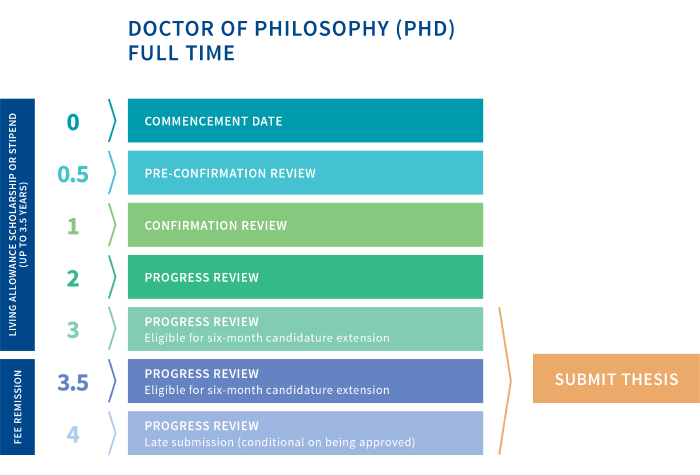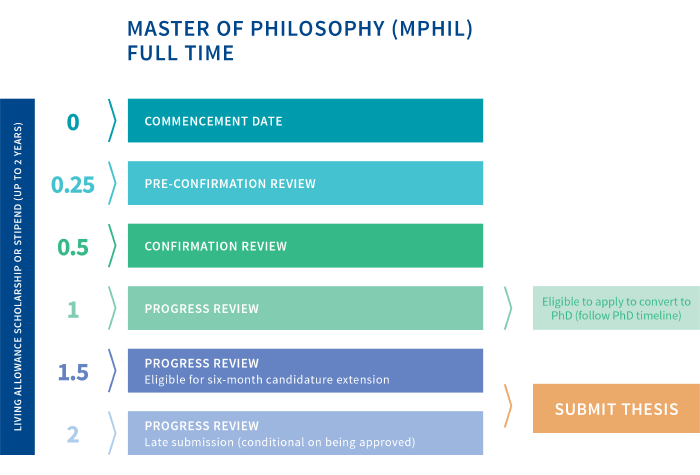Reviewing your progress
A summary of the reviews that you are required to complete as a graduate researcher.
What is a progress review?
Progress reviews are required to be completed on schedule every six or twelve months depending on candidature stage. The purpose of progress reviews are:
- To encourage discussion between the graduate researcher and their advisory committee (includes supervisors)
- To monitor progress, highlight achievements, identify skills and knowledge that require further development
- To discuss and set goals or offer guidance on timelines for research outcomes
- To support the timely completion of your thesis
Guidelines - Requirements for Graduate Research Progress Reviews
[Developed by the Graduate Research Coordinators Working Group, and approved by the Associate Dean of Research Training July 2023]
Doctor of Philosophy -Engineering & IT [DR-PHILEIT]
Pre-confirmation
- Prepare a written report (~3,000-6,000 words) containing:
- Introduction to the research topic;
- Draft of literature review of the research topic, identifying research gaps to be pursued in the PhD;
- Initial set of research questions to be addressed in the PhD;
- Initial journal/conferences publication plan (optional);
- Draft of methodology and method to address at least the first research question;
- Progress on execution of method to date:
- Progress on obtaining critical methodological skills if relevant (e.g. high-performance: computing, fieldwork, lab skills, mathematical skills, experimental techniques, etc.);
- Progress on obtaining critical equipment and datasets;
- Progress with the ethics application (if applicable);
- Initial results, if any;
- Timeline for confirmation within the next six months;
- Provide the pre-confirmation report to the advisory committee (via email) at least 1 week before the pre-confirmation meeting date;
- A short oral presentation to the PhD committee (typically ~15-20min); and
- Answer questions from the committee following presentation regarding the report and presentation.
Confirmation
- Prepare a written report of at least 3,000 and up to 10,000 words containing:
- Introduction to research topic;
- A concise statement of the research question(s);
- An argument for the relevance and importance of your research;
- A literature review (critical review of the literature, identifying gaps and include research questions to be addressed);
- As appropriate to the discipline of study, an explanation of the conceptual framework to be used and/or a summary of experimental methods and equipment requirements:
- Progress / results on research questions to date;
- Progress on obtaining critical methodological skills if relevant (e.g. high-performance computing, fieldwork, lab skills, experimental techniques, mathematical/statistical skills, ethics approval, etc.);
- Progress on obtaining critical equipment, if relevant;
- A proposed timeline for the candidature until the expected thesis submission date (this is your research plan);
- A list of publications, presentations, conference, posters or creative works you have produced during your probationary candidature;
- A list of expected outputs, i.e. publications, presentations, posters or creative works
- Provide the confirmation report to the advisory committee (via email) at least 1 week before the confirmation meeting date;
- Provide proof of completion of research integrity training;
- Prepare and submit the iThenticate similarity report;
- Schedule the presentation at a time when your advisory committee can attend;
- Give an oral presentation of up to 30-40 minutes on your project, with an additional 15 minutes for questions;
- Your presentation will be used to assess your research proposal, and the standard of your academic verbal communication;
- For an example of a confirmation report, please ask your supervisor.
Progress Reviews (from 2nd year of candidature)
- Remind the chair about the research topic and its importance;
- Update the chair on any changes to the research questions, methodology or publication plan since the last progress review, including the reasons why. If there are any changes, provide an updated literature review, concise statement of the new research questions and an argument for their relevance and the conceptual framework; and/or a summary of experimental methods and equipment requirements to be used to approach the new research questions;
- Update on research progress/results since the last review meeting including publications and presentations and if (still) relevant, progress on obtaining critical methodological skills and progress on obtaining critical equipment;
- Update on thesis writing progress:
- As part of ‘Thesis and Research Plan’ and if relevant 'Research Outputs’ sections within CiA, documents are to be uploaded demonstrating progress to date. (This should not be additional work, they do not need to write a report specifically for their progress review, but evidence needs to be provided to demonstrate their progress.)
- For example, if stating Chapter 1 Literature Review is 50% complete then a draft of the literature review is to be uploaded. If an experimental chapter is 60% complete, a document demonstrating this is to be uploaded - the document may include introduction, materials/methods, results obtained to date, discussion points, and what is remaining to be 100% complete;
- If multiple documents are uploaded as part of the point above, the GR candidate should combine all documents into a single file and circulate to their advisory committee prior to their yearly progress meeting;
- As part of ‘Thesis and Research Plan’ and if relevant 'Research Outputs’ sections within CiA, documents are to be uploaded demonstrating progress to date. (This should not be additional work, they do not need to write a report specifically for their progress review, but evidence needs to be provided to demonstrate their progress.)
- Update on conceptual framework, methodology and methods to address the remaining research questions and progress to date on these questions;
- Provide updated timeline to completion;
- Provide all documents associated with the progress review to the advisory committee (via email) at least one week before the meeting date;
- Give a 15-20 min presentation to the committee.

Master of Philosophy Engineering & IT [MR-PHILEIT]
Pre-confirmation
- Prepare a written report and provide it to your committee one week before the pre-confirmation meeting containing:
- Introduction to the research topic;
- A draft literature review of the research topic identifying the problem and research questions to be pursued in the Masters;
- Description of methodology and method to address the research question(s);
- Progress on obtaining critical skills (if relevant) (e.g. high performance computing, fieldwork, lab skills, mathematical skills, experimental techniques, etc.);
- Progress on obtaining critical equipment and datasets (if relevant);
- Progress with ethics application (if relevant);
- Initial results;
- Timeline until confirmation;
- A short oral presentation to the MPhil committee (typically 15-20 minutes)
- Answer questions from the committee following the presentation;
- Provide the pre-confirmation report to the advisory committee (via email) at least one week before the pre-confirmation meeting date.
Confirmation
- Prepare a written report of at least 3,000 and up to 10,000 words containing:
- Introduction to the research topic;
- A concise statement of the research question(s);
- An argument for the relevance and importance of your research;
- A literature review (critical review of the literature, identify gaps and include research question(s) to be addressed);
- As appropriate to the discipline of study, an explanation of the conceptual framework to be used and/or a summary of experimental methods and equipment requirements;
- Progress/results on research questions to date;
- Progress on obtaining critical methodological skills if relevant (e.g. high-performance computing, fieldwork, lab skills, experimental techniques, mathematical/statistical skills, ethics approval, etc.);
- Progress on obtaining critical equipment, if relevant;
- A proposed timeline for the candidature until the expected thesis submission date (this is your research plan);
- Provide proof of completion of research integrity training;
- A list of publications, presentations, conference, posters or creative works you have produced during your probationary candidature;
- Provide the confirmation report to the advisory committee (via email) at least 1 week before the confirmation meeting date;
- Prepare and submit the iThenticate similarity report;
- Schedule the presentation at a time when your advisory committee can attend;
- Give an oral presentation of up to 20-30 minutes on your project, with an additional 15 minutes for questions;
- Your presentation will be used to assess your research proposal, and the standard of your academic verbal communication;
- For an example of a confirmation report, please ask your supervisor.

Review meetings
A key part of the progress review process is the review meeting whereby you and your advisory committee (your supervisors and committee chair) discuss and assess your progress. The meetings should be scheduled within two weeks of milestone/review due dates.
How do I prepare for my progress review?
It is your responsibility to organise your advisory committee for your meeting:
- Contact your committee at least a month in advance to arrange a date. Note that the minimum attendance requirement for your meeting includes: your principal supervisor, a co-supervisor, your committee chair and yourself.
- Contact your department administrator for room bookings, etc.
- Submit any written material (draft thesis chapters, a literature review, updated research plan or a paper manuscript) to your principal supervisor at least one week before the actual meeting takes place. Consult with your supervisor to find out what you need to provide for your progress review well before the meeting. Review research targets and outcomes that were set for the year.
What is the progress review process?
- Dates for these meetings are set automatically by our candidature management system (CiA) from the date you commenced, but these dates change to correspond to any change in your thesis date. You can view your key milestone dates including your expected thesis submission date, supervisors and other candidature details on the landing page when you log into your Student Portal and click on the Graduate Research tab on the top of the screen.
- Your review forms are online and sent to you within 3 months of your review date
- You will be provided with a link to the review in the notification
- Once you submit your review, you should arrange your review meeting so that your committee members can attend
- Your committee chair completes the review and submits it. Most reviews are assessed by your department/school’s GR Academic Coordinator
- The graduate research team processes the review and you will receive a notification of the outcome. Your advisory committee will recommend one of the following review outcomes:
- Satisfactory progress
- Extend candidature (only available when nearing your expected thesis submission date)
- At risk of making unsatisfactory progress
- Three month formal warning of unsatisfactory progress.
How to get help
If you are having an issues preparing for your progress review please discuss this with your principal supervisor or Get in touch with the graduate research team.
If you have concerns about your progress or research and don’t want to wait for your progress review meeting to raise your concerns, see the Services, support and activities for more information or contact us at FEIT-GR-Candidates@unimelb.edu.au.